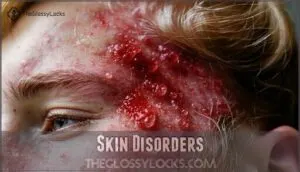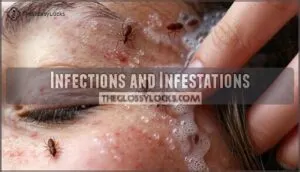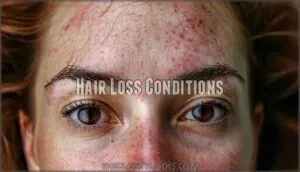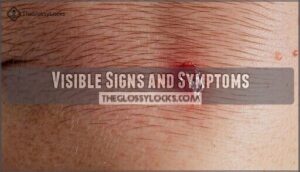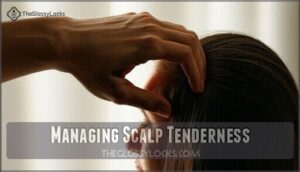This site is supported by our readers. We may earn a commission, at no cost to you, if you purchase through links.
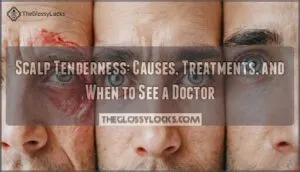 Scalp tenderness can feel like your head’s thrown on a too-tight hat—sore, sensitive, or even itchy.
Scalp tenderness can feel like your head’s thrown on a too-tight hat—sore, sensitive, or even itchy.
Common culprits include tight ponytails, sunburn, stress, or medical conditions like psoriasis, migraines, or infections like folliculitis.
Sometimes, hair loss conditions like alopecia or dandruff irritation add to the discomfort.
Symptoms range from sensitivity when brushing your hair to redness, flakes, or tenderness that lingers.
Treating it starts with identifying the cause, whether using over-the-counter anti-inflammatory shampoos, loosening hairstyles, or following your doctor’s advice.
And remember—your scalp’s like skin everywhere else; consistency in care makes all the difference.
Curious about soothing solutions? Let’s explore soothing solutions and find the best approach for scalp tenderness.
Table Of Contents
- Key Takeaways
- Causes of Scalp Tenderness
- Symptoms of Scalp Tenderness
- Diagnosing Scalp Tenderness
- Treating Scalp Tenderness
- Managing Scalp Tenderness
- Frequently Asked Questions (FAQs)
- What conditions cause scalp or head pain?
- How do I treat scalp tenderness?
- What are the symptoms of scalp tenderness?
- What causes scalp tenderness?
- Why does my scalp hurt a lot?
- What is scalp pain?
- What autoimmune disease causes scalp pain?
- How to cure a sensitive scalp?
- Can anxiety cause scalp tenderness?
- Can changes in weather or climate affect scalp tenderness?
- Conclusion
Key Takeaways
- Identify the cause of scalp tenderness, like tight hairstyles, skin conditions, or infections, to treat it effectively.
- Use gentle shampoos, avoid heat styling, and try soothing remedies like aloe vera or cool compresses for relief.
- Manage stress and protect your scalp from sunburn or harsh weather to prevent irritation and sensitivity.
- Consult a doctor if symptoms persist, worsen, or include persistent pain, hair loss, or visible infections.
Causes of Scalp Tenderness
Scalp tenderness can be caused by a variety of factors, ranging from skin conditions like psoriasis or rashes to physical triggers such as tight hairstyles or sunburn.
Scalp tenderness stems from diverse causes, from skin issues like psoriasis to physical irritants like tight hairstyles or sunburn.
Understanding these causes helps you address the discomfort early and prevent it from getting worse, which is a key step in managing scalp tenderness.
Skin Disorders
Dry, itchy, inflamed skin can leave your scalp feeling tender.
Conditions like psoriasis, eczema, or lichen planus often cause discomfort. Watch for scaly patches or redness, and seek help if symptoms worsen.
- Psoriasis treatment manages scaly patches effectively.
- Avoid eczema triggers like harsh shampoos.
- Know folliculitis causes, such as blocked hair follicles.
- Spot ringworm symptoms like bald, scaly patches.
- Learn about dermatitis types for better prevention.
Infections and Infestations
Infections and infestations like bacterial folliculitis, fungal ringworm, and head lice often trigger scalp tenderness.
Mite infestations and scalp infections can cause itching, redness, and discomfort.
These issues spread quickly, especially in shared spaces.
Preventing infections is key—regular scalp care, avoiding shared combs, and prompt treatment with medicated shampoos or prescriptions can save your scalp from unnecessary irritation and trouble.
Physical Factors
Scalp tenderness can result from physical factors like hairstyles or accessories that pull hair too tight.
You might notice your scalp feeling tender to touch or inflamed after certain routines:
- Tight hairstyles like ponytails or buns, causing pain and sensitivity.
- Heat styling tools overheating strands, leading to scalp inflammation.
- Heavy hair accessories or head injuries contributing to scalp pain.
Hair Loss Conditions
Hair loss conditions, like alopecia areata and telogen effluvium, can cause scalp tenderness and hair shedding.
You might notice balding patches, itching, or tingling.
CCCA symptoms, common in middle-aged Black women, include pain and follicle damage.
These conditions often trigger sensitivity where hair thins, and recognizing early signs, like unusual discomfort or noticeable hair loss, is key to prevention.
Symptoms of Scalp Tenderness
When your scalp feels tender, you might notice sensations like pain, itching, or tingling, which can range from mild discomfort to more intense sensitivity.
Sometimes, visible symptoms like redness, flaking, or hair loss can accompany these feelings, giving you more clues about what’s causing the irritation.
Sensations and Feelings
Dealing with scalp tenderness can feel like an uphill battle. You might notice itching sensations, a tingling scalp, or even that burning feeling after trying a new product.
Facing scalp tenderness can feel overwhelming, but recognizing triggers and making simple changes can lead to soothing relief and better care.
Sometimes, numbness sneaks in, or throbbing pain flares up, making the sensitive scalp unbearable. These sensations often signal scalp sensitivity or discomfort, begging you to reconsider your hair care routine.
A tingling scalp can also be one of the signs of hair growth, which may indicate that your hair is growing, and this can be a positive sign.
Visible Signs and Symptoms
When your scalp feels tender to touch, watch for telltale signs that something’s off:
- Scalp redness, often paired with irritation or swelling.
- Skin peeling or flaking that makes your scalp itch or look dry.
- Severe cases show bleeding scalp, pus formation, or sores.
These symptoms—mild or severe—might point to infections, hair loss, or underlying skin conditions.
Associated Conditions
What’s behind that nagging scalp pain? Often, headaches, allergies, and autoimmune disorders like psoriasis or eczema are involved.
Hair loss conditions also play a sneaky role in scalp sensitivity.
Here’s a quick breakdown:
| Condition | Common Symptoms | Impact on Scalp |
|---|---|---|
| Headaches | Tight, dull pain | Heightened sensitivity |
| Allergies | Itching, redness | Irritation, inflammation |
| Psoriasis | Scales, itching | Severe tenderness |
| Eczema | Flaking, dryness | Persistent discomfort |
| Hair Loss | Shedding, itching | Pain with sensitivity |
Diagnosing Scalp Tenderness
To figure out what’s causing your scalp tenderness, doctors start by examining your symptoms and medical history.
They’ll rule out underlying issues like infections or nerve conditions to pinpoint the exact problem.
Medical History and Examination
To pinpoint the reasons behind scalp tenderness, your doctor will start with your scalp medical history.
They’ll ask about symptom onset, recent changes in diet, stress, or injury, and may assess your hair for issues like breakage.
A scalp examination could include checking body patterns or sensitive spots.
This personalized approach guarantees a thorough scalp diagnosis adapted to your needs.
Differential Diagnosis
After reviewing your medical history, doctors focus on ruling out conditions that mimic scalp pain. A thorough physical exam evaluates scalp tenderness and sensitivity.
They might order diagnostic tests like skin biopsies or blood work to check for infections or inflammation. Severity assessment helps identify scalp conditions like psoriasis or alopecia.
When to worry? Persistent symptoms or worsening scalp sensitivity need attention. Malassezia impacts scalp health and should be considered as a potential factor.
- Imaging tests for neurological disorders
- Skin biopsies for infections
- Blood tests for inflammation
- Severity analysis of scalp sensitivity
Treating Scalp Tenderness
Treating scalp tenderness starts with identifying the cause, whether it’s a skin issue, an infection, or a physical trigger like a tight ponytail.
You’ll find that simple changes, over-the-counter solutions, or medical treatments can quickly bring relief.
Over-the-Counter Solutions
When tackling scalp tenderness, over-the-counter products can be a lifesaver. Look for OTC shampoos or topical treatments targeting pain and itch relief. Choosing wisely guarantees effective scalp sensitivity management.
Keep it simple—mild, fragrance-free formulas often work wonders. Many people find relief using specialized scalp products.
| Problem | Recommended OTC Solution |
|---|---|
| Itching | Anti-itch shampoos |
| Dryness | Hydrating scalp oils |
| Redness | Aloe vera gels |
| Flaking | Zinc-based shampoos |
| Mild Pain | Cooling sprays |
Medical Interventions and Prescriptions
Prescription treatments target scalp tenderness effectively.
Doctors may recommend these options:
- Prescription Shampoos for conditions like psoriasis or dermatitis.
- Topical Steroids to ease inflammation and itching.
- Antifungal Meds for fungal infections causing irritation.
- Antibiotic Options to address bacterial infections.
These medicated creams, shampoos, and oral medications help tackle persistent symptoms, giving you relief and comfort.
Home Remedies and Self-Care
Sometimes, scalp tenderness just needs a little pampering. A soothing scalp massage improves circulation, while oil treatments like coconut or argan oil hydrate and calm irritation.
Try a cold compress for quick relief or switch to gentle products to avoid harsh chemicals.
Stress reduction—think meditation or yoga—can also ease symptoms.
These home remedies offer simple steps for better scalp care and relief. To further promote a healthy scalp, consider incorporating foods rich in zinc into your diet to support healthy scalp and overall well-being with simple steps.
Managing Scalp Tenderness
Managing scalp tenderness means making simple changes to your daily routine and treating your scalp with care.
You’ll want to focus on preventing irritation, avoiding triggers, and knowing when it’s time to see a doctor for persistent discomfort.
Preventive Measures and Lifestyle Changes
To keep your scalp happy, stick to gentle haircare—fragrance-free products and lukewarm water work wonders.
Manage stress with self-care; it’s amazing for scalp health.
Protect against sunburn by wearing hats or using sunscreen.
Stay hydrated and eat a balanced diet for better scalp sensitivity.
For a gentle approach, consider sulfate-free shampoo options.
Embrace good scalp hygiene and avoid overloading with heavy scalp products for lasting comfort.
Avoiding Triggers and Irritants
Protecting your scalp starts with simple changes. Watch for ingredient lists in scalp products to avoid allergies.
Say goodbye to tight hairstyles—they stress your scalp over time. Sun protection matters, so grab a hat or sunscreen.
Stress reduction helps with scalp sensitivity—breathe deeply! Finally, stick to gentle products to prevent irritation and soothe those sensitivity triggers.
Consider using specially formulated cleansers for sensitive skin to address your scalp needs, and remember that simple changes can make a significant difference.
Seeking Professional Medical Advice
If home remedies aren’t cutting it, it’s time to think about when to seek medical attention.
A scalp dermatologist can assess your condition, ensuring no diagnostic delays.
Treatment adherence is key, and a specialist referral can pinpoint the issue.
Second opinions help too.
For persistent issues, consider fragrance-free hair products to minimize irritation.
Here’s a quick guide:
| Issue | Specialist | Diagnosis Tools | Severity | Action |
|---|---|---|---|---|
| Persistent pain | Scalp specialist | Scalp pain diagnosis | Moderate | Medical checkup |
| Skin irritation | Dermatologist | Visual exam | Mild to severe | Consultation |
| Hair loss | Trichologist | Scalp condition diagnosis | Mild, ongoing | Specialist care |
| Infections | Dermatologist | Lab tests | Severe | Immediate care |
| Slow healing sores | Scalp dermatologist | Biopsy | Severe | Urgent referral |
Frequently Asked Questions (FAQs)
What conditions cause scalp or head pain?
Scalp or head pain can stem from tight hairstyles, migraines, tension headaches, infections like folliculitis, or conditions like psoriasis and alopecia.
Even sunburns and nerve issues, such as occipital neuralgia, might trigger discomfort.
How do I treat scalp tenderness?
Treat scalp tenderness by loosening tight hairstyles, switching to gentle shampoos, and avoiding heat styling.
Try relaxing scalp massages, over-the-counter creams, or cool compresses.
Persistent pain? Don’t tough it out—consult a doctor for personalized care.
What are the symptoms of scalp tenderness?
You might notice pain, irritation, or sensitivity when touching your scalp.
It could feel itchy, tingly, or even burning.
Sometimes, redness, flaking, or bumps appear, and hair loss or tenderness might tag along.
What causes scalp tenderness?
Issues like nerve pain, skin conditions, infections, hair products, or tight hairstyles can leave your scalp sore.
Sometimes, it’s sunburn, rashes, or even stress.
Think of it as your scalp waving a red flag!
Why does my scalp hurt a lot?
Persistent, pulsating pain often points to inflamed nerves, tight hairstyles, or conditions like psoriasis.
Maybe you’ve overused heat tools, skipped sunscreen, or faced stress.
Listen to your scalp—it’s saying, "Care for me, please!
What is scalp pain?
Scalp pain happens when your scalp feels sensitive, sore, or tender to touch.
It can result from skin conditions, tight hairstyles, infections, or nerve issues.
Think of it as your scalp’s way of protesting!
What autoimmune disease causes scalp pain?
Ever wonder why your scalp aches without a clear reason?
Autoimmune diseases like lupus or scalp psoriasis can attack your skin cells, causing painful inflammation.
It’s frustrating, but treatments can help ease discomfort and manage symptoms.
How to cure a sensitive scalp?
Treat a sensitive scalp by avoiding harsh hair products, tight hairstyles, and stress.
Use gentle shampoos, stay hydrated, and try soothing remedies like aloe vera or diluted essential oils.
If symptoms persist, consult a dermatologist.
Can anxiety cause scalp tenderness?
Ever felt like stress sets your scalp on fire?
Anxiety can cause scalp tenderness by triggering tension headaches, muscle tightness, or increased sensitivity.
Managing stress with relaxation techniques or professional help often eases the discomfort and can help alleviate anxiety.
Can changes in weather or climate affect scalp tenderness?
Yes, shifts in weather or climate can make your scalp more sensitive.
Dry, cold air might cause itchiness or flakiness, while humidity or heat could increase oiliness or irritation, leaving your scalp feeling uncomfortable.
Conclusion
Remember when CDs skipped if you weren’t careful? That’s your scalp—delicate and needing care.
Scalp tenderness can stem from various causes, like tight hairstyles, irritation, or underlying conditions. Treating it means identifying triggers, whether switching to gentle shampoos, loosening hairstyles, or consulting a doctor.
Consistent care is key—your scalp deserves as much attention as your skin. So, listen to your scalp, avoid irritants, and don’t hesitate to seek professional help when symptoms persist or worsen, which is a critical step in maintaining scalp health.
- https://www.actasdermo.org/es-translated-article-sensitive-scalp-diagnosis-articulo-S0001731022010146
- https://www.ninds.nih.gov/health-information/disorders/occipital-neuralgia
- https://www.ncbi.nlm.nih.gov/pmc/articles/PMC9527678/
- https://www.mayoclinic.org/diseases-conditions/psoriasis/symptoms-causes/syc-20355840

